
 (4 / 5)
(4 / 5)
The Sherman Theatre’s production of Chekhov’s The Cherry Orchard is reimagined in Early 1980’s Wales and gets to the roots of the social upheaval of Thatcherism.
The Cherry Orchard Production Team
Written by Gary Owen from Anton Chekhov
Director: Rachel O’Riordan
Designer: Kenny Miller
Lighting: Kevin Treacy
Cast (with Chekhov’s equivalent characters in parenthesis)
Denise Black as Rainey (Lyubov Ranevskaya)
Simon Armstrong as Gabriel (Leonid Gaev)
Matthew Bulgo as Lewis (Yermolai Lopahin)
Hedydd Dylan as Valerie (Varya)
Morfydd Clark as Anya (Anya)
Richard Mylan as Ceri (Petya Trofimov
Alexandria Riley as Dottie (Dunyasha)
Introduction
The characters of Boris Simeonov-Pishchik – a landowner, Charlotta Ivanovna – a governess, Simon Yepihodov – the estate clerk, Firs – a footman, aged 87, Yasha, a young footman, A Stationmaster and a passer-by are all omitted.
On Saturday 3rd July 1982, Prime Minister Margaret Thatcher made a keynote speech at Cheltenham racecourse in the aftermath of the Falklands War. I remember it well – I was there. When I say, I was there, I should clarify this. At the time, I was a serving member of the Gloucestershire Constabularly, assigned to the equivalent unit known as the SPG in the Met Police, and, being the junior member of the team, I was given the responsibility to guard the P.M.’s car. If I knew then, what I know now, I might have been tempted to place a bomb under the chassis myself! I jest I hasten to add for I don’t want an unwelcome visit from Special Branch after this post goes live.
In this speech, Maggie says this:-
“We have instead a new-found confidence—born in the economic battles at home and tested and found true 8,000 miles away.
That confidence comes from the re-discovery of ourselves, and grows with the recovery of our self-respect.”
When Chekhov wrote his last play, he was near to death. It opened at the Moscow Art Theatre only six months before his demise in July 1904. The play prophesied what was to come for Russia and this materialised in the failed 1905 Uprising in Moscow and eventual success in the Russian Revolution of 1917. You didn’t have to be too much of a prophet to foresee this – the inevitable end of the social conditions existing at the time the play was written was there for everyone to see. The sheer size of The Cherry Orchard represented a microcosm of Russia.
Other Reimaginations of The Cherry Orchard
Gary Owen’s reimagined setting of Pembrokeshire in 1982 differs in that the people were actually living through the social upheaval that the Thatcher Years and inevitably, what came afterwards, although the extent of this change was not appreciated at that time.
There has been been a number of other revisions of The Cherry Tree through the ages, largely due to the political undercurrents of the play.
In 1977, Trevor Griffiths rendered Trofimov (Ceri) as a Marxist hero and the bourgeois characters, (Lewis and sometimes Gabriel) in a very negative light.
Earlier, in 1950, a production in New York City had Helen Hayes (Lyubov Ranevskaya/Raina), presiding over a large plantation with all the servants as slaves).
In 1973 Public Theatre’s version was played entirely with black actors protesting against their exclusion from the classical repertory.
Janet Suzman’s 2000 production The Free State, a reimagining of The Cherry Orchard was transplanted and full adapted to a post-apartheid South Africa.
As perennial as the grass, The Cherry Orchard remains one of the most popular plays to be produced in the world. In fact, the Nottingham Playhouse are putting on a production starting later this week.
Gary Owen and The Cherry Orchard
Gary Owen’s reworking is a play for our time. The writing is clear and in some ways improves on the original. Chekhov wrote the play as a comedy, although, subsequently, many directors interpret it as a tragedy. In Gary’s play, the comedy is more transparent and the sometimes sly Welsh humour works a treat.
His Raina is a sot and, again, I think this works better than the traditional Lyubov Ranevskaya, whose actions, I have always found a little ambiguous at times.
His Anya maintains Chekhov’s idea of this character. The first production of The Cherry Orchard was put on at the Moscow Arts Theatre by its artistic director at the time, Konstantin Stanislavski. Chekhov disliked the way it was produced intensely and wrote a number of letters complaining about it, as was his way. In one he wrote, Anya, I fear, should not have any sort of tearful tone… Not once does my Anya cry, nowhere do I speak of a tearful tone, in the second act there are tears in their eyes, but the tone is happy, lively. I think that Anya in Gary’s writing and the Sherman’s production, lives up to that ideal.
A problem that crops up, because of the time and setting of the play under review, is the relationship between Lewis and Ceri. In Chekhov’s original, Lopahin and Trofimov forge a rather curious alliance. Lopahin, the noveaux riche landowner and Trofimov, the class conscious socialist, would work together for the benefit of the new Russia. Whereas in Simon’s work, Ceri, (representing the Thatcherite property developer) and Ceri, (the on the dole socialist and pseudo-anarchist), never seem to have that level of a common sense of purpose.
The absence of the character Firs is regretful because it robs Simon’s play of probably the most poignant and meaningful scenes in his entire repertoire. At the end of the play, when the family vacate the property for the last time, there is a substantial delay before Firs, the 87-year old faithful servant trudges across the stage to rest wearily on a sofa. One gets the impression that he will never arise from it. Firs was known to be very ill and the family assumed that he had been taken to hospital, but, in fact he had been left behind. Chekhov was making a statement about people who pretend they care, but, in reality, only half-care at best. I think this would tie in with the callousness of Thatcherism beautifully which has carried on to this day.
The Story
Borderline alcoholic Raina has been forced by her daughter Anya and adopted daughter Valerie to return to her ancestral property Bloumfield in Pembrokeshire. Raina had been living well beyong her means and racking up a huge bill at the Dorchester in London. Valerie, who had been running Bloumfield in Rainey’s absence had repeatedly sent her mother letters informing her of the dire financial position the estate was in. Raina had chosen to ignore these letters and the situation had become so parlous that the bank were now calling in the debt and the property is going to be auctioned.
Lewis, son of a lowly servant on the Estate, has now become quite well off and owns a construction factory. This is Margaret Thatcher’s Britain and he has a plan to save the situation by selling off Bloumfield to property developers.
Romantic interest is shown by Anya’s involvement with her ex-tutor Certi, an on-the-dole sometime volunteer teacher.
There is a great deal of social conscience on display. Thatcher’s idea of selling off council properties at a budget price, social mobility ,(Lewis from rags to riches), The Enterprise Allowance Scheme, which Ceri is considering to take advantage of to form a record label, providing that he can come up with a thousand pounds to start it off – offered as a gift by Anya and a loan by Lewis, who respects the entrepreneurial spirit behind the idea.
It’s all here. The dawning of a new age that we are all coming to terms with today.
The Production
The play is directed by the Sherman’s artistic director Rachel O’Riordan and has a crispness and clarity about it that reminded me of a production by Michael Grandage of Shakespeare’s As You Like It that I was privileged to watch at the Lyric Hammersmith in 2000. So impressed by the production, I wrote to the Crucible Theatre in Sheffield, where it originated, and much to my surprise and delight received a lengthy email back from the director stating his belief that theatre should be clear in its intentions and have a clarity of purpose behind it. This is exactly how I feel about this direction.
A model train plays a significant part as well and is not explained until the final scene. Replacing Firs Pinteresque moment, a young boy runs on and picks up the train whilst shouting for his mummy. The ghost of Raina’s drowned young son, (and possibly the reason for her habitual drinking), has been abandoned. So the train represents the memory of her drowned boy.
Ms O’Riordan has collaborated with writer Gary Owen on previous occasions. Iphigenia In Splott was received as one of the most important theatre productions of 2015 and Killology that transferred to the Royal Court earlier this year. The O’Riordan/Owen collaboration has to be one of the most dynamic and intriguing partnerships in British theatre today, and I look forward to future works from them both.
The production is beautifully cast, and there is not a weak link among them. It would be unfair to single one individual out as they are uniformly excellent. I would like to say though that Denise Black’s Rainey, reminded me, in a good way, with the character of Patsy in Absolutely Fabulous .
The minimalist design is an easy on the eye but seems a little sparse furniture-wise for landowners to live in. A bookcase located stage left plays an important part in the action, as its craftsmanship is recognised in contrast to today’s mass produced self-assembled substitute.
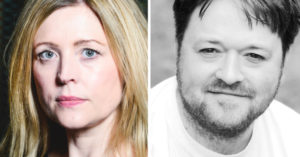
Rachel O’Riordan and Gary Owen
Alexandria Riley and Denise Black
 Morfydd Clark and Richard Mylan
Morfydd Clark and Richard Mylan
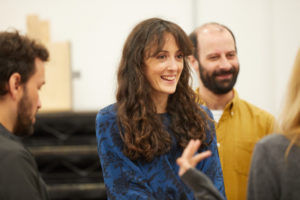 Hedydd Dylan and Matthew Bulgo
Hedydd Dylan and Matthew Bulgo
Denise Black
Simon Armstrong
Summary
Gary Owen’s work is an excellent new way of viewing a classic great play. The three hours performance time passed by in an instance and I can’t really fault this production, other than the couple of instances where the writer’s decision to take what he wanted from Chekhov’s play, could have been put to better effect.
It runs at the Sherman Theatre Cardiff main house until 3rd November 2017. For times and ticket information please refer to http://http://www.shermantheatre.co.uk/performance/theatre/the-cherry-orchard/
Suitable for all ages. A little mild bad language.
Roger Barrington



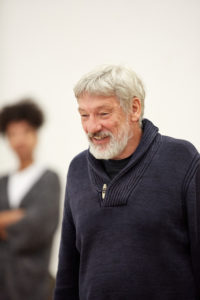
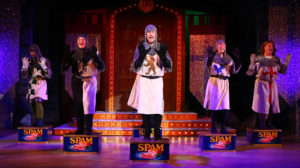
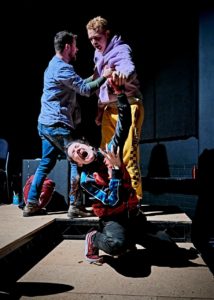
 (2 / 5)
(2 / 5)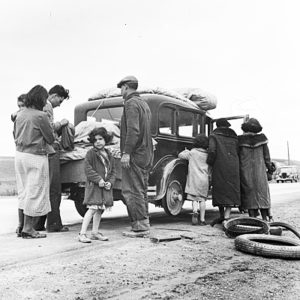
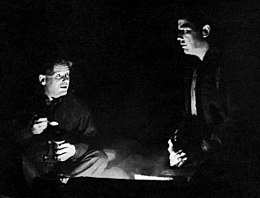
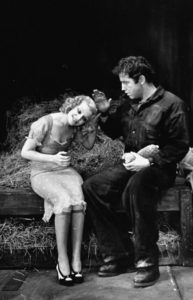
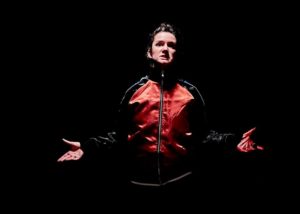
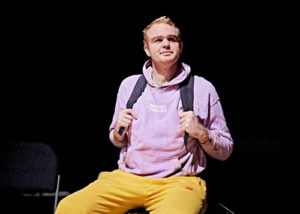
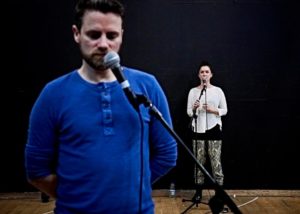
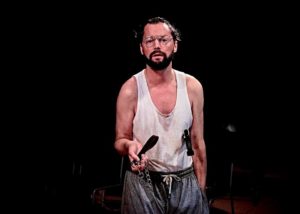
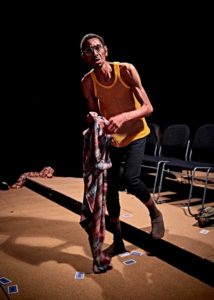

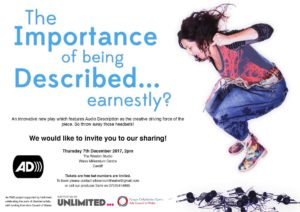
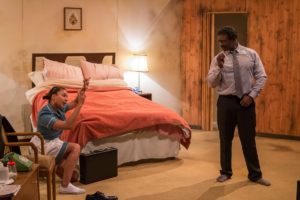
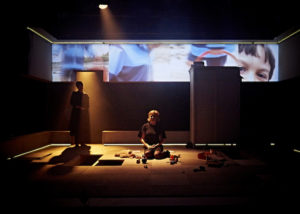
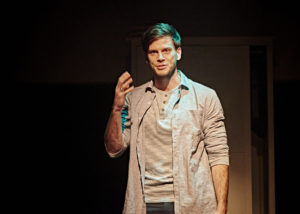
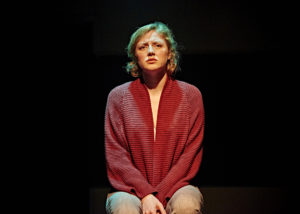
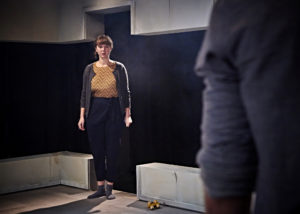
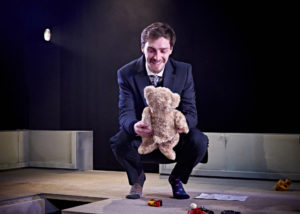
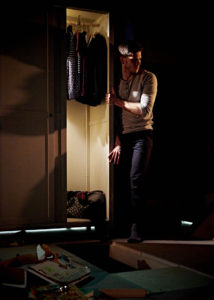


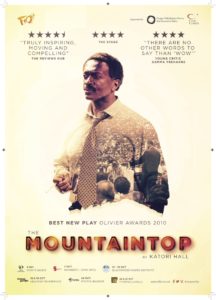
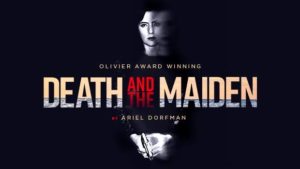
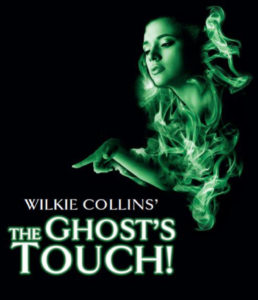

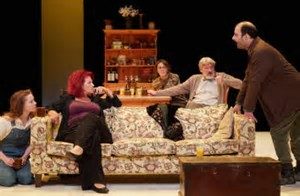
 (5 / 5)
(5 / 5)